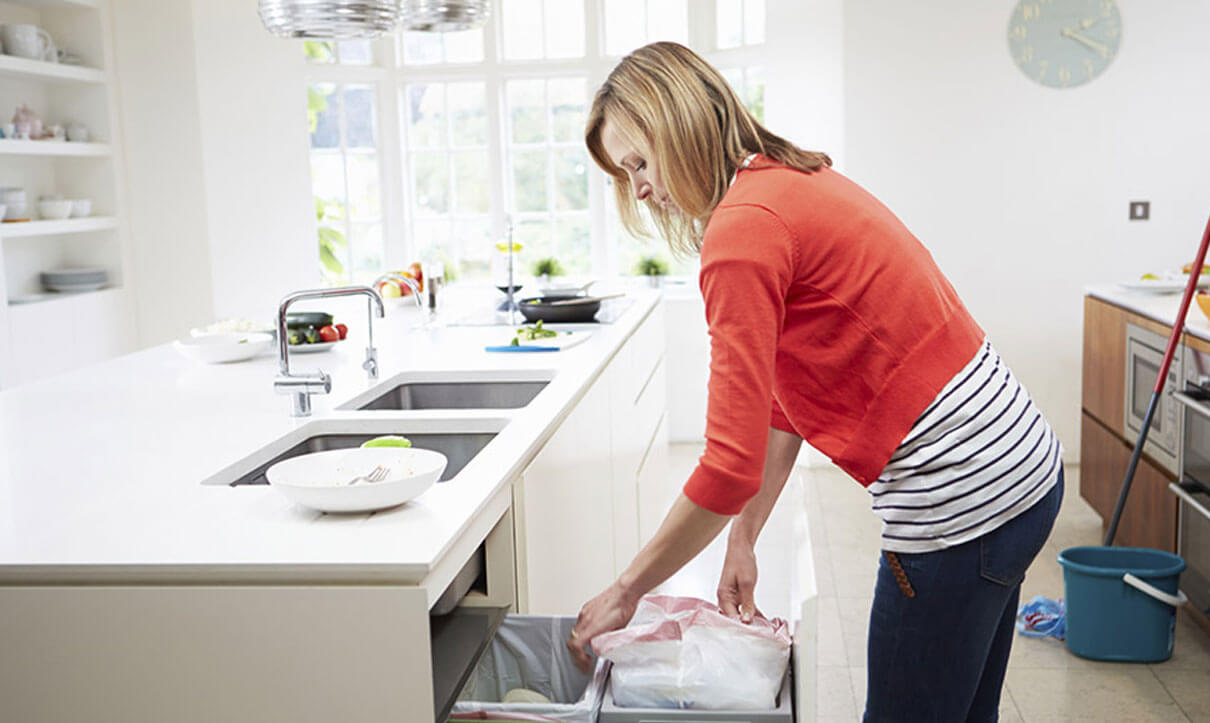Cleaning your kitchen can feel overwhelming, but with the right approach and some helpful secrets, you can maintain a spotless and sanitary kitchen with minimal effort. Here are the secrets to making kitchen cleaning easy, effective, and fast:
1. Clean as You Go
- Prevent Pile-Up: Instead of waiting until after you're done cooking, clean while you're preparing meals. Wash cutting boards, utensils, and bowls immediately after use to avoid a mess piling up.
- Wipe Surfaces After Use: As you work in the kitchen, wipe down counters, the stove, and cutting boards as you finish using them. This prevents crumbs, spills, and splatters from building up.
2. Declutter Your Countertops
- Keep Only Essentials on Counters: Clear your kitchen counters of unnecessary items. Only keep out what you regularly use (e.g., coffee maker, toaster, knife block). A clutter-free space makes cleaning easier and quicker.
- Use Storage Solutions: For items you don’t use daily, such as appliances or extra utensils, use cabinets or drawers to keep them out of sight.
3. Organize Your Cabinets and Drawers
- Sort and Purge: Regularly go through your kitchen cabinets and drawers, getting rid of expired items, duplicate utensils, and anything you don't use. This reduces clutter and makes it easier to find what you need.
- Drawer Organizers: Invest in drawer organizers for utensils, cutlery, and tools. It makes it easier to keep drawers tidy and quickens the process of putting things away.
4. Focus on High-Traffic Areas
- Countertops: Regularly wipe down countertops with an all-purpose cleaner or a mixture of vinegar and water. If there’s a spill, clean it up immediately to avoid stains or lingering smells.
- Sink: The kitchen sink tends to get dirty quickly. Rinse dishes right after use and wipe down the sink daily with a disinfectant or cleaner to prevent grime buildup.
5. Deep Clean Your Appliances Regularly
- Fridge: Clean the fridge once a month. Wipe down the shelves, remove expired food, and organize everything neatly. Use a mild soap and water solution to wipe surfaces.
- Oven: Clean your oven every couple of months. Use an oven cleaner or a DIY paste of baking soda and water to scrub off grease and food debris.
- Microwave: Clean your microwave regularly by heating a bowl of water with vinegar or lemon juice in it. The steam loosens grease, and then you can easily wipe it away with a cloth.
- Dishwasher: Run a cycle with a dishwasher cleaner or a cup of vinegar to remove mineral buildup and odors. Clean the filter regularly.
6. Tackle Stubborn Grease
- Stovetop: Grease splatters are common on stovetops. Use a degreaser or a mix of vinegar and water to clean it off. For stubborn grease, apply a baking soda paste and let it sit for 10-15 minutes before scrubbing.
- Backsplash: Wipe down your backsplash with a mixture of warm water and a bit of dish soap. For tougher spots, use a mix of baking soda and water to scrub.
- Range Hood: Don’t forget to clean your range hood filter. Soak it in hot water with dish soap to remove grease and grime, then rinse it thoroughly.
7. Use Natural Cleaners
- Vinegar & Water: A solution of 50% white vinegar and 50% water can clean most kitchen surfaces. It's great for countertops, sinks, and even your stovetop.
- Baking Soda: Baking soda is a fantastic natural cleaner. It can be used to scrub stubborn spots, deodorize the fridge, or remove odors from your sink.
- Lemon: Lemon juice is a natural disinfectant and can be used to clean cutting boards, brighten surfaces, and freshen up the kitchen.
8. Don’t Forget the Floors
- Sweep Daily: The kitchen floor gets dirty quickly with crumbs, spills, and dust. Sweep or vacuum your kitchen floors daily, especially after cooking or meals.
- Mop Weekly: Mop the floor once a week with a mild cleaner appropriate for your floor type. A microfiber mop works best for grabbing dust and dirt without leaving streaks.
- Spot Clean Spills: Immediately clean up spills to prevent them from staining or attracting pests. For sticky spills, use warm water and dish soap to loosen the residue.
9. Take Care of Trash and Recycling
- Empty Trash Regularly: Don’t let your trash sit for too long. Empty it daily or as needed to prevent odors and pests. Wipe down the trash can with disinfectant every few weeks.
- Recycling: Keep your recycling bins clean by rinsing containers before placing them in the bin. This helps prevent unpleasant smells.
10. Clean the Kitchen Sink
- Daily Scrub: The sink tends to collect food particles and soap scum. Clean the sink every day with a gentle scrub. For extra shine, you can polish the sink with a bit of olive oil on a cloth.
- Dispose of Food Scraps Properly: Use a garbage disposal cleaner or fresh lemon to eliminate odors in the sink. Clean the drain regularly to keep it from clogging.
11. Organize and Clean Pantry
- Purge Expired Items: Go through your pantry once a month and toss out any expired food or items you won’t use.
- Label and Organize: Group similar items together, like canned goods, grains, or snacks. Consider using baskets or bins for easy access to small items.
12. Create a Cleaning Routine
- Daily: Wipe down counters, load/unload the dishwasher, wash dishes, and clean up spills.
- Weekly: Clean the fridge, microwave, stovetop, and mop the floors. Organize and declutter cabinets and pantry.
- Monthly: Deep clean appliances (oven, range hood, dishwasher) and purge expired pantry items. Scrub the kitchen sink and faucet thoroughly.
13. Stay on Top of Spills and Messes
- Clean Spills Immediately: Whether it’s a coffee spill on the counter or a tomato sauce stain on the floor, cleaning spills immediately prevents them from becoming bigger problems.
- Prevent Future Messes: Use splatter screens when cooking to minimize grease and sauce splashes on the stove and counters.


